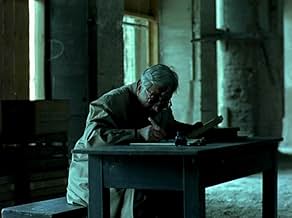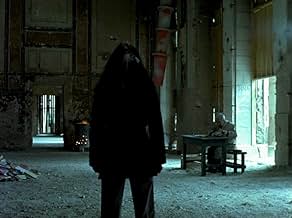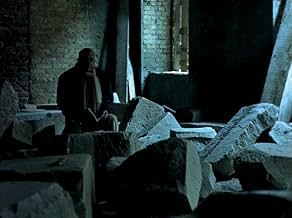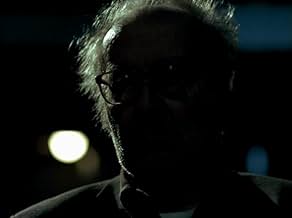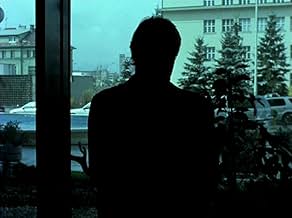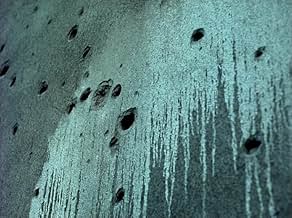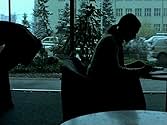AVALIAÇÃO DA IMDb
6,8/10
3,2 mil
SUA AVALIAÇÃO
Adicionar um enredo no seu idiomaAn indictment of modern times divided into three "kingdoms": "Enfer" ("Hell"), "Purgatoire" ("Purgatory") and "Paradis" ("Paradise").An indictment of modern times divided into three "kingdoms": "Enfer" ("Hell"), "Purgatoire" ("Purgatory") and "Paradis" ("Paradise").An indictment of modern times divided into three "kingdoms": "Enfer" ("Hell"), "Purgatoire" ("Purgatory") and "Paradis" ("Paradise").
- Prêmios
- 1 vitória e 6 indicações no total
Avaliações em destaque
It is sometimes hard for creative and well meaning filmmakers to accept the fact that their political and philosophical understanding of the world might not be as rounded as their movie making skills. Godard shows in this excruciating film that he clearly falls into this category of filmmakers. 'Notre Musique' is well intentioned, for sure. Godard seeks to obfuscate the lines between reality and drama, the sensible and the absurd (heaven guarded by US marines). In doing so, however, the film becomes Godard's 'international politics explained' more than an engaging piece of cinema. Being a visual medium as it is, cinema needs to add layers of subtlety to what's seen (so that we look beyond that which is seen), in order to be not only an effective messenger but also an exercise in self-exploration. 'Notre Musique' is a blaring loudspeaker with Godard in control of the microphone.
"Notre Musique" could be either a late night college bull session or one of those Monty Python skits where historical warmongers sit around rationally comparing their various atrocities with a coolly objective BBC moderator.
Maybe it's a French intellectual's reality show pitch: we'll set up a dialog between a Jew and a Palestinian at a literary meeting in bombed-out Sarajevo as observed by living ghost Native Americans after bombarding them with images of war and genocide through 19th and 20th century history.
Amidst this trumped-up pretentiousness, Godard the filmmaker does make some good points about war and memory. While the historical images, both from fiction and journalism, are colorized to contemporize them, one easily concedes, yeah, war is hell and hey didn't "Saving Private Ryan" prove that to us, when Godard cannily trumps that thought by discussing how war in fiction - from legend and poetry to movies -- touches people more than the reality.
Then just as you're about to protest, hey, you're showing all these war images without their raison d'etre, Godard springs into a profound verbal and visual illustration of the importance of context, leading to an appreciation of how history is written by the victors. The points about the impact on Western psyche of the Trojans from Homer's perspective were more insightful than all of the "Troy" movie.
However, those debaters that are translated in the subtitles talk in didactic epigrams that will make more sense when one can rewind the DVD for reflection (including the explanation of the title). The French intellectual smug superiority gets annoying -- we don't see any images of WW II collaborators vs. Resistance fighters, let alone colonial legacy issues in Algeria or Muslims in France today.
While I'm not sure if the images of discarded books amidst the ruins of war were about the hopelessness of literature and the arts or its unquenchable survival as some are salvaged, Godard has an intellectual's faith in the power of dialog (and cigarette smoking), though pessimistic about the ability of the media to communicate it effectively, as he sets up an overly freighted discussion between an idealistic and ambitious young Israeli woman of Russian descent, whose grandparents were saved from the Holocaust by a Righteous Gentile, and an articulate Palestinian writer, as translated by another Wandering French/Israeli Jew.
I think he was also trying to incorporate suicide bombers into the trajectory of French intellectual thought from Durkheim to Camus that sees it as an existential act of protest against anomie, but well, Jean Luc, we can't all be French.
Typical for a Godard film, the woman to my right gushed that it was her second screening and it was her favorite of his films, and the woman on my left said she couldn't figure out what it was about.
Maybe it's a French intellectual's reality show pitch: we'll set up a dialog between a Jew and a Palestinian at a literary meeting in bombed-out Sarajevo as observed by living ghost Native Americans after bombarding them with images of war and genocide through 19th and 20th century history.
Amidst this trumped-up pretentiousness, Godard the filmmaker does make some good points about war and memory. While the historical images, both from fiction and journalism, are colorized to contemporize them, one easily concedes, yeah, war is hell and hey didn't "Saving Private Ryan" prove that to us, when Godard cannily trumps that thought by discussing how war in fiction - from legend and poetry to movies -- touches people more than the reality.
Then just as you're about to protest, hey, you're showing all these war images without their raison d'etre, Godard springs into a profound verbal and visual illustration of the importance of context, leading to an appreciation of how history is written by the victors. The points about the impact on Western psyche of the Trojans from Homer's perspective were more insightful than all of the "Troy" movie.
However, those debaters that are translated in the subtitles talk in didactic epigrams that will make more sense when one can rewind the DVD for reflection (including the explanation of the title). The French intellectual smug superiority gets annoying -- we don't see any images of WW II collaborators vs. Resistance fighters, let alone colonial legacy issues in Algeria or Muslims in France today.
While I'm not sure if the images of discarded books amidst the ruins of war were about the hopelessness of literature and the arts or its unquenchable survival as some are salvaged, Godard has an intellectual's faith in the power of dialog (and cigarette smoking), though pessimistic about the ability of the media to communicate it effectively, as he sets up an overly freighted discussion between an idealistic and ambitious young Israeli woman of Russian descent, whose grandparents were saved from the Holocaust by a Righteous Gentile, and an articulate Palestinian writer, as translated by another Wandering French/Israeli Jew.
I think he was also trying to incorporate suicide bombers into the trajectory of French intellectual thought from Durkheim to Camus that sees it as an existential act of protest against anomie, but well, Jean Luc, we can't all be French.
Typical for a Godard film, the woman to my right gushed that it was her second screening and it was her favorite of his films, and the woman on my left said she couldn't figure out what it was about.
Some film critics, like Stuart Klawans of "The Nation" magazine, Desson Thomson of "The Washington Post," and Manohla Dargis of "The New York Times," have hailed this latest effort from Godard, the undisputed giant of the French New Wave, in glowing terms. I think it's a sloppy little film that wouldn't have seen the light of the big screen thousands of miles from home were it not for the fact that it was made by a legendary director.
"Notre Musique" is divided into three sections: the first (12 minutes) is subtitled "Kingdom 1 Hell" and the last (6 minutes) is called "Kingdom 3 Heaven." The long middle section (62 minutes) is "Kingdom 2 Purgatory." "Hell" is a montage depicting scenes of war battles and the carnage that is created by war - made of clips from documentary archival footage and fictional feature films. "Heaven" is a contemporary shoot in a lush park-like setting next to a lake, where it's peaceable and sunny, a lovely stream meanders through, and a few people frolic about. Both of these brief sequences could easily have been made by film school students.
It's difficult to describe the main middle section. It takes place at an international conference in Sarajevo of intellectuals, literati, journalists, diplomats and arts people. Was it an actual conference or something staged for the film? You can't tell just from watching. Several well known people play themselves, including Godard. But mixed in among them are actors playing roles of people given other names.
There's lots of talk. A number of big ideas are casually put on the table, some intriguing but entirely unexplored (example: "killing a man to defend an idea isn't defending an idea, it's killing a man"), some certainly questionable or debatable (examples: "humane people don't start revolutions, they start libraries or cemeteries," or "if the house is already on fire, it's foolish to try to save the furniture"), others simply false on the face of it (example: "The only serious philosophical problem is suicide").
There are allusions to the Nazis; to the destruction - during the Bosnian war - and recent reconstruction of the nearby ancient Mostar Bridge, first built in 1566; to the perennial middle east problem of Palestine and Israel; to the seeming universality of man's inhumanity to man (example: Native Americans in full tribal regalia standing solemnly alongside the Mostar Bridge).
There is footage wasted on various moving forms of transportation planes, buses, cars, trains, streetcars and on people getting into and out of cars, like typical filler footage in a third rate TV drama from Burbank, CA. And there are little meaningless toss off scenes, like an impassive waiter serving flutes of wine carefully to six people seated around a table, a scene that segues into another, in which a fat male guest intrusively wraps a hammy arm around a shapely impassive waitress and pushes her through a little faux dance. So what's that all about the well off even intellectuals exploiting working people? Who knows.
The best bits occur in a seminar conducted by Godard himself, about the way in which cinema can portray opposite tendencies in human nature and society, what he refers to as "shot" and "reverse shot." He mentions several such polarities, e.g., certainty vs. ambiguity, victim vs. criminal. Another example: Godard asserts that the story of Jews in Israel is fiction, while the story of the Palestinians is documentary. What does that mean? One wonders.
Well, it's true that a larger-than-life romantic aura has developed around the Israelis and their struggle to secure a homeland over the past 60 years, while we think of Palestinians instead in undramatic, concrete terms of poverty, joblessness, lack of infrastructure, ineffective leadership, and so on.
Regarding cinema, Godard's comments made me think of scenes from the recent propagandistic documentary about Hugo Chavez and Venezuela, "The Revolution Will Not be Televised." In that film there is a sequence in which shots are fired from a bridge into a crowd below. Viewed from one angle, the scene invites the interpretation that opposition snipers are firing on a pro-Chavez crowd, but, viewed from another angle, the opposite conclusion is possible: that Chavez's people are shooting at opposition protesters. What is the truth? Both versions? Neither?
Animating this theme further are two young women who seem also to represent opposites. There is Judith Lerner (played by actress Sarah Adler), an Israeli journalist who chooses to live in Palestine. She has come to Sarajevo because "I wanted to see a place where reconciliation seems possible." Judith is an optimist. On the other hand we have Olga (Nade Dieu) who is depressed and suicidal, despite her comfortable life. She holds herself back from suicide only because she fears pain and the next world. In the end she is shot by marksmen, we are told, and we rejoin her in the final Heaven sequence.
I do agree with Godard that Purgatory could easily be imagined as a place where endless pseudo-intellectual blather keeps confusing and mesmerizing people, to their detriment. It's the sort of place that people who conduct themselves in this manner during life deserve to be stuck in for the hereafter. Talk is cheap and yet sometimes it has the power to move whole nations toward war or self destruction. Is this what he's driving at? Who can tell?
The only basis for recommending this film is that it is the creation of one of the great filmmakers of the last 50 years, and we owe Godard this respect, to observe any new work of his, approaching it soberly and with openness. But we are not required to genuflect to the master, casting a blind eye toward mediocrity. (In French, Arabic, English, Hebrew, Serbo-Croatian & Spanish) My rating: 6/10 (B-). (Film seen on 02/07/05). If you'd like to read more of my reviews, send me a message for directions to my websites.
"Notre Musique" is divided into three sections: the first (12 minutes) is subtitled "Kingdom 1 Hell" and the last (6 minutes) is called "Kingdom 3 Heaven." The long middle section (62 minutes) is "Kingdom 2 Purgatory." "Hell" is a montage depicting scenes of war battles and the carnage that is created by war - made of clips from documentary archival footage and fictional feature films. "Heaven" is a contemporary shoot in a lush park-like setting next to a lake, where it's peaceable and sunny, a lovely stream meanders through, and a few people frolic about. Both of these brief sequences could easily have been made by film school students.
It's difficult to describe the main middle section. It takes place at an international conference in Sarajevo of intellectuals, literati, journalists, diplomats and arts people. Was it an actual conference or something staged for the film? You can't tell just from watching. Several well known people play themselves, including Godard. But mixed in among them are actors playing roles of people given other names.
There's lots of talk. A number of big ideas are casually put on the table, some intriguing but entirely unexplored (example: "killing a man to defend an idea isn't defending an idea, it's killing a man"), some certainly questionable or debatable (examples: "humane people don't start revolutions, they start libraries or cemeteries," or "if the house is already on fire, it's foolish to try to save the furniture"), others simply false on the face of it (example: "The only serious philosophical problem is suicide").
There are allusions to the Nazis; to the destruction - during the Bosnian war - and recent reconstruction of the nearby ancient Mostar Bridge, first built in 1566; to the perennial middle east problem of Palestine and Israel; to the seeming universality of man's inhumanity to man (example: Native Americans in full tribal regalia standing solemnly alongside the Mostar Bridge).
There is footage wasted on various moving forms of transportation planes, buses, cars, trains, streetcars and on people getting into and out of cars, like typical filler footage in a third rate TV drama from Burbank, CA. And there are little meaningless toss off scenes, like an impassive waiter serving flutes of wine carefully to six people seated around a table, a scene that segues into another, in which a fat male guest intrusively wraps a hammy arm around a shapely impassive waitress and pushes her through a little faux dance. So what's that all about the well off even intellectuals exploiting working people? Who knows.
The best bits occur in a seminar conducted by Godard himself, about the way in which cinema can portray opposite tendencies in human nature and society, what he refers to as "shot" and "reverse shot." He mentions several such polarities, e.g., certainty vs. ambiguity, victim vs. criminal. Another example: Godard asserts that the story of Jews in Israel is fiction, while the story of the Palestinians is documentary. What does that mean? One wonders.
Well, it's true that a larger-than-life romantic aura has developed around the Israelis and their struggle to secure a homeland over the past 60 years, while we think of Palestinians instead in undramatic, concrete terms of poverty, joblessness, lack of infrastructure, ineffective leadership, and so on.
Regarding cinema, Godard's comments made me think of scenes from the recent propagandistic documentary about Hugo Chavez and Venezuela, "The Revolution Will Not be Televised." In that film there is a sequence in which shots are fired from a bridge into a crowd below. Viewed from one angle, the scene invites the interpretation that opposition snipers are firing on a pro-Chavez crowd, but, viewed from another angle, the opposite conclusion is possible: that Chavez's people are shooting at opposition protesters. What is the truth? Both versions? Neither?
Animating this theme further are two young women who seem also to represent opposites. There is Judith Lerner (played by actress Sarah Adler), an Israeli journalist who chooses to live in Palestine. She has come to Sarajevo because "I wanted to see a place where reconciliation seems possible." Judith is an optimist. On the other hand we have Olga (Nade Dieu) who is depressed and suicidal, despite her comfortable life. She holds herself back from suicide only because she fears pain and the next world. In the end she is shot by marksmen, we are told, and we rejoin her in the final Heaven sequence.
I do agree with Godard that Purgatory could easily be imagined as a place where endless pseudo-intellectual blather keeps confusing and mesmerizing people, to their detriment. It's the sort of place that people who conduct themselves in this manner during life deserve to be stuck in for the hereafter. Talk is cheap and yet sometimes it has the power to move whole nations toward war or self destruction. Is this what he's driving at? Who can tell?
The only basis for recommending this film is that it is the creation of one of the great filmmakers of the last 50 years, and we owe Godard this respect, to observe any new work of his, approaching it soberly and with openness. But we are not required to genuflect to the master, casting a blind eye toward mediocrity. (In French, Arabic, English, Hebrew, Serbo-Croatian & Spanish) My rating: 6/10 (B-). (Film seen on 02/07/05). If you'd like to read more of my reviews, send me a message for directions to my websites.
Godard's status as a filmmaker, and an auteur, cannot be challenged. He no longer needs to make a name for himself and is free (within reason) to pursue the projects he likes, and carry them out to his own satisfaction. He also has an enormous and varied body of work 'under his belt', along with the experience that this has brought. And yet, these facts do not seem to have made him complacent. No one could accuse him of 'going commercial', and though the new Godard is 'nicer' than the strident, know-it-all politician of his Maoist period, he can't be accused of slowing down.
This film is a case in point. Within in, one finds so much going on, so many ideas, and at such a pace, that it really needs multiple viewings. At 75 minutes, it flies by. It is hard, therefore, to cover all the issues raised by the film, but I will try to give a summary of my impressions.
The film follows a basic triptych structure named according to the rather Catholic names of Hell, Purgatory and Heaven. Parts 1 and 3 act like short wings to the hour-long centrepiece.
In a brutal first 10 minutes, appropriately called 'Hell', one is confronted with a mix of images of war from film and from war footage. Personally, I've always found documentary footage of war, however grainy or poorly shot, much more troubling than the most violent parts of acted film (such as Saving Private Ryan). Is Godard pushing the two together (implying moral responsibility of the filmmaker), or contrasting them through montage? (Suggesting the dual aspects of film-making, which he will emphasise later in the film, when comparing Israelis, who have become a film, to the Palestinians, who have become a documentary.) Like the rest of the film, it is a brilliantly edited tour-de-force of images and ideas.
The second section, Purgatory, consists largely of discussions between writers and journalists drawn to Sarajevo for a literary conference. The number of questions (though not answers) that bubble to the surface in these discussions is astounding. Citations (a Godardian standard) are given new meaning through editing / montage. And many more eminently quotable lines are added by Godard and the other participants, literary figures playing themselves, such as Mahmoud Darwish, whose analysis is original and perceptive, and Juan Goytisolo. This section has a documentary feel, but an artist's aesthetic. The film itself looks superb, demonstrating a real eye for shot composition. This makes his films 'surface' extremely watchable, even before the 'substance' is broached. The substance is tasty too, with a superabundance of wit on parade, not in the sense of trite humour, but real insight, combined with a sober sigh before the unchangeable.
The last 'movement' is of course 'Heaven', which is amusingly guarded by US marines, and looks a little like the less-than-heavenly site in which the end of Godard's 'Weekend' was played out. This playfulness and self-referentiality was typical of the rest of the film also, for example, in the trio of vocal Native Americans reminiscent of characters in 'Sympathy for the Devil'. Where does quotation end and creation begin? Godard's work is full of citation and self-allusion, but due to the (specifically filmic) nature of montage and narrative context, these citations and allusions take on new meanings.
The film is, therefore, certainly elitist, as are so many great films (and novels for that matter). 'Notre Musique' demands a cine-literate viewer, and preferably also familiar with Godard, since there is a lot of meaningful and playful self-referentiality. (One could also argue that someone new to this kind of film-making might be challenged to improve their cine-literacy). More importantly, it demands an alert viewer, because there is potentially much more happening than merely what is on the screen. Godard, in examining filmic space has also created a space between screen and viewer, making him or her an active part of the process of meaning-making.
Certainly, if all films were of this caliber, one would get a sore head thinking them through, but it is important to be enlivened by such a work as this from time to time, just to remember film's artistic and intellectual potential.
This film is a case in point. Within in, one finds so much going on, so many ideas, and at such a pace, that it really needs multiple viewings. At 75 minutes, it flies by. It is hard, therefore, to cover all the issues raised by the film, but I will try to give a summary of my impressions.
The film follows a basic triptych structure named according to the rather Catholic names of Hell, Purgatory and Heaven. Parts 1 and 3 act like short wings to the hour-long centrepiece.
In a brutal first 10 minutes, appropriately called 'Hell', one is confronted with a mix of images of war from film and from war footage. Personally, I've always found documentary footage of war, however grainy or poorly shot, much more troubling than the most violent parts of acted film (such as Saving Private Ryan). Is Godard pushing the two together (implying moral responsibility of the filmmaker), or contrasting them through montage? (Suggesting the dual aspects of film-making, which he will emphasise later in the film, when comparing Israelis, who have become a film, to the Palestinians, who have become a documentary.) Like the rest of the film, it is a brilliantly edited tour-de-force of images and ideas.
The second section, Purgatory, consists largely of discussions between writers and journalists drawn to Sarajevo for a literary conference. The number of questions (though not answers) that bubble to the surface in these discussions is astounding. Citations (a Godardian standard) are given new meaning through editing / montage. And many more eminently quotable lines are added by Godard and the other participants, literary figures playing themselves, such as Mahmoud Darwish, whose analysis is original and perceptive, and Juan Goytisolo. This section has a documentary feel, but an artist's aesthetic. The film itself looks superb, demonstrating a real eye for shot composition. This makes his films 'surface' extremely watchable, even before the 'substance' is broached. The substance is tasty too, with a superabundance of wit on parade, not in the sense of trite humour, but real insight, combined with a sober sigh before the unchangeable.
The last 'movement' is of course 'Heaven', which is amusingly guarded by US marines, and looks a little like the less-than-heavenly site in which the end of Godard's 'Weekend' was played out. This playfulness and self-referentiality was typical of the rest of the film also, for example, in the trio of vocal Native Americans reminiscent of characters in 'Sympathy for the Devil'. Where does quotation end and creation begin? Godard's work is full of citation and self-allusion, but due to the (specifically filmic) nature of montage and narrative context, these citations and allusions take on new meanings.
The film is, therefore, certainly elitist, as are so many great films (and novels for that matter). 'Notre Musique' demands a cine-literate viewer, and preferably also familiar with Godard, since there is a lot of meaningful and playful self-referentiality. (One could also argue that someone new to this kind of film-making might be challenged to improve their cine-literacy). More importantly, it demands an alert viewer, because there is potentially much more happening than merely what is on the screen. Godard, in examining filmic space has also created a space between screen and viewer, making him or her an active part of the process of meaning-making.
Certainly, if all films were of this caliber, one would get a sore head thinking them through, but it is important to be enlivened by such a work as this from time to time, just to remember film's artistic and intellectual potential.
This is not entertainment...
I'd seen Contempt (1963) and Breathless (1960) many years ago and thoroughly enjoyed both. After 1964, I sort missed all that he directed until now, which appeared on late-night TV. And no wonder it was on so late at night...
It seems that, as many of us get older and maybe wiser, we like to expound on things philosophical. Bergman did it well, and without resorting to didactic circularity or confusion and still managed to tell a good story. Woody Allen uses satire brilliantly for the same purpose.
However, Godard here uses the bare bones of a simple, quasi-documentary style story and one that it episodically fractured and with much symbolism to reflect upon 'what it all means': that is, life, death and the whole damn thing. Using the current Israeli problem with Palestine and vice-versa, he explores the three concepts of Hell, Purgatory and Heaven, using each to show what humanity has done, what it's doing and where it should be going, respectively.
The first, Hell, is obvious: with a montage of cuts from a multitude of news and film clips, Godard shows us the extent to which we prey upon each other even as we pray for each other. So, there are some real all too real scenes of the dead, the dying and the executed during the many wars that have been documented during the last hundred years or so. Nothing new here at all...
The second, Purgatory (a place for waiting), is well an exposition about waiting: waiting for a bus, for a train, for a plane, for a meeting to start, for a bridge to be rebuilt, for a nation to recover from war, for people to begin to understand each other. And this is all done within the thin framework of the story of Olga (Nade Dieu), the Jewish journalist from Tel Aviv who is attending a lecture by Godard (playing himself) in Sarajevo, and who is trying to understand why human problems cannot seem to be resolved, no matter what. Significantly, by choosing just Olga, Godard has certainly brought his philosophy to a very personal level, and one with which we can all identify, more or less.
All of that is rendered moot when Olga appears to commit an unspeakable act when she returns to Tel Aviv. Perhaps Godard should have told her that it's not the end that matters but the journey to achieve that end?
The third the shortest vignette is our final destination: as a prisoner of Nature, complete with - American! - border guards who let Olga through to join the happy throng. Essentially: strip off civilization and return to our basics to find out who we really are...
I think I'll stick with tackling prejudice, reducing global warming and trying to make a positive difference rather than taking Olga's choice.
It's well filmed, as you'd expect from Godard; the music is, at times, quite beautiful to hear; and the Sarajevo mise-en-scene is a stark reminder of our collective sins. An annoying aspect for me, however, is that not all dialog was translated and subtitled; perhaps it wasn't necessary?
So, while interesting visually and aurally, I'd recommend this only for those who like to reflect upon existential problems within philosophy.
I'd seen Contempt (1963) and Breathless (1960) many years ago and thoroughly enjoyed both. After 1964, I sort missed all that he directed until now, which appeared on late-night TV. And no wonder it was on so late at night...
It seems that, as many of us get older and maybe wiser, we like to expound on things philosophical. Bergman did it well, and without resorting to didactic circularity or confusion and still managed to tell a good story. Woody Allen uses satire brilliantly for the same purpose.
However, Godard here uses the bare bones of a simple, quasi-documentary style story and one that it episodically fractured and with much symbolism to reflect upon 'what it all means': that is, life, death and the whole damn thing. Using the current Israeli problem with Palestine and vice-versa, he explores the three concepts of Hell, Purgatory and Heaven, using each to show what humanity has done, what it's doing and where it should be going, respectively.
The first, Hell, is obvious: with a montage of cuts from a multitude of news and film clips, Godard shows us the extent to which we prey upon each other even as we pray for each other. So, there are some real all too real scenes of the dead, the dying and the executed during the many wars that have been documented during the last hundred years or so. Nothing new here at all...
The second, Purgatory (a place for waiting), is well an exposition about waiting: waiting for a bus, for a train, for a plane, for a meeting to start, for a bridge to be rebuilt, for a nation to recover from war, for people to begin to understand each other. And this is all done within the thin framework of the story of Olga (Nade Dieu), the Jewish journalist from Tel Aviv who is attending a lecture by Godard (playing himself) in Sarajevo, and who is trying to understand why human problems cannot seem to be resolved, no matter what. Significantly, by choosing just Olga, Godard has certainly brought his philosophy to a very personal level, and one with which we can all identify, more or less.
All of that is rendered moot when Olga appears to commit an unspeakable act when she returns to Tel Aviv. Perhaps Godard should have told her that it's not the end that matters but the journey to achieve that end?
The third the shortest vignette is our final destination: as a prisoner of Nature, complete with - American! - border guards who let Olga through to join the happy throng. Essentially: strip off civilization and return to our basics to find out who we really are...
I think I'll stick with tackling prejudice, reducing global warming and trying to make a positive difference rather than taking Olga's choice.
It's well filmed, as you'd expect from Godard; the music is, at times, quite beautiful to hear; and the Sarajevo mise-en-scene is a stark reminder of our collective sins. An annoying aspect for me, however, is that not all dialog was translated and subtitled; perhaps it wasn't necessary?
So, while interesting visually and aurally, I'd recommend this only for those who like to reflect upon existential problems within philosophy.
Você sabia?
- Citações
Olga Brodsky: If anyone understands me, then I wasn't clear.
- ConexõesEdited from Anjos das Ruas (1943)
- Trilhas sonorasDas Buch der Klänge
Composed by Hans Otte
Principais escolhas
Faça login para avaliar e ver a lista de recomendações personalizadas
- How long is Our Music?Fornecido pela Alexa
Detalhes
Bilheteria
- Faturamento bruto nos EUA e Canadá
- US$ 139.922
- Fim de semana de estreia nos EUA e Canadá
- US$ 8.210
- 28 de nov. de 2004
- Faturamento bruto mundial
- US$ 293.681
Contribua para esta página
Sugerir uma alteração ou adicionar conteúdo ausente

